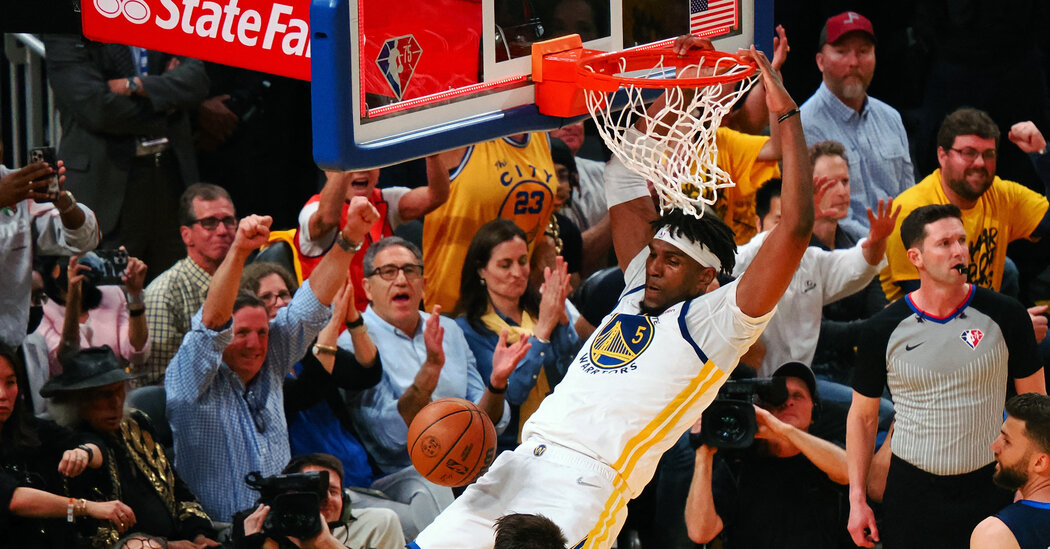
SAN FRANCISCO — The day before Kevon Looney produced the best game of his professional career, he sat in a hallway at Chase Center in San Francisco, thinking about the way his role had changed since Golden State drafted him in 2015.
This was a team known for its smaller lineups; that’s how it had won a championship that year. At 6-foot-9, and despite a wingspan of more than seven feet, Looney was considered undersized.
Looney chuckled at the thought, then he considered it a little bit more.
“The league’s kind of changed, and now I’m more the traditional center now in the N.B.A.,” Looney said, as he thought about the way people sometimes talk about Golden State. “So it kind of is weird to me. Sometimes it feels like a slap in the face when they’re like, ‘They don’t have any size.’”
Looney typically is not the most talked-about member of the Warriors. He was drafted less than two weeks after Golden State won its first championship with Steve Kerr as coach, and was part of the team for four consecutive appearances in the N.B.A. finals and two championships. After overcoming early injury woes, he became a critical part of Golden State’s roster, and this year was one of only five players leaguewide to play in all 82 regular-season games.
In the playoffs this year, Golden State has been able to count on him. He didn’t start in Games 1 through 5 of their Western Conference semifinal series against the Memphis Grizzlies, then started and grabbed 22 rebounds in the Game 6 win that clinched the series.
On Friday night in Game 2 of the Western Conference finals series against the Dallas Mavericks, Looney scored 21 points with 12 rebounds in the 126-117 comeback win. It was the first time since his only season at U.C.L.A. that he had scored more than 20 points in a game. It was also the first time a Warriors center had scored 20 points with at least 10 rebounds in the playoffs since 1977.
“We see the work that he’s put in to make that a reality,” Golden State guard Stephen Curry said. “Now, in the playoffs, just taking that next step. He brings a lot of joy to what we do in the locker room. I’ll call him, like, the muse in the locker room. He kind of just has a great demeanor about him. He’s the bridge between the vets and the young guys. Pretty awesome to see him adapt to that role.”
Kerr called Looney “everybody’s favorite guy.”
Forward Draymond Green called him a master of professionalism.
“The same professional he is today, he was when he came in the league,” Green said.
Looney may have projected professionalism and levelheadedness to Green, but the truth is that when Looney was drafted, he was a wide-eyed 19-year-old just trying not to break anything.
This team was riding high after its championship, and his job was to fit in, not to stand out. As the only rookie, he didn’t have anyone with common experiences to talk to about what that was like and what he should do.
“Definitely was intimidating,” Looney said.
That July, he was in Las Vegas after playing in the N.B.A.’s Summer League tournament, where teams field rosters of their young players and N.B.A. hopefuls. The veterans on his team were in Las Vegas for a players’ union awards show, and one night Andre Iguodala texted, asking him to bring over some doughnuts.
“It’s like 1 in the morning,” Looney said, laughing. “I didn’t even know if he was serious. First day, I’m already scared. I don’t want to mess up on my first day.”
He attended the awards show, but when the team went up onstage together, he said he was too shy to join them. That shyness persisted during the early part of the season as the team went 24-0 on its way to an N.B.A.-record 73 wins.
“They used to joke that I didn’t talk for the first six months,” Looney said.
In addition to requesting doughnut deliveries at 1 a.m., Iguodala took Looney under his wing and helped him adapt. Green would invite Looney to spend time with him just to make him feel more comfortable in this new setting.
That helped in the locker room, but Looney would experience other challenges. He had hip surgery before his rookie year began. Then he had another hip injury in his second season.
Looney had never missed a game in college or high school, and called the injuries “devastating.”
His parents helped quell his self doubt, but the organization was unsure.
“We didn’t know what we had,” Kerr said, noting that the team did not pick up Looney’s contract option for a fourth season because he had not played much. He continued: “And then his third year he has a great year, it’s like, uh oh, we might lose this guy.”
Looney was keenly aware of the questions the organization had about him, but he took solace in the support from his teammates.
“Always got the respect from my teammates, and that made me keep going, that made me feel good about myself and know that I’m doing the right thing,” Looney said. “Even if the fans — you might have a bad game, the fans might say you’re not good enough, somebody might say you’re not good enough — but when you’ve got your teammates saying, like, ‘Man I don’t care what the stat lines say, I want to be out there with Loon,’ it’s a great honor.”
Looney was inactive throughout the playoffs for his first two seasons. But in his third season, he began to have a significant role for the Warriors and contributed to their 2017-18 championship run. He often defended the best players.
Now 26, he’s a veteran on a team that has incorporated young guys who are experiencing their first playoff runs. Looney knows what that felt like and tries to help guide them through the process.
And if Golden State wins another championship this year, it will feel a little bit more special, given his contributions.
“To make an impact, and start a lot of these games, playoff games, be there for the team, have some big roles in playoff moments, this’ll mean a lot to me,” Looney said. “It’ll just be kind of like the cherry on top to be able to close it out and win and be there for my team.”




